Key takeaways:
- Kitchen stress arises from the high-pressure environment of culinary work, necessitating effective stress management strategies to enhance performance and teamwork.
- Implementing techniques such as structured mise en place, open communication, and mindfulness can significantly reduce stress and foster a positive kitchen atmosphere.
- Balancing personal and professional life is crucial for maintaining passion and preventing burnout in the demanding culinary industry.
- Setting boundaries and practicing self-care, including taking breaks and sharing struggles with loved ones, helps rejuvenate and improve overall well-being.
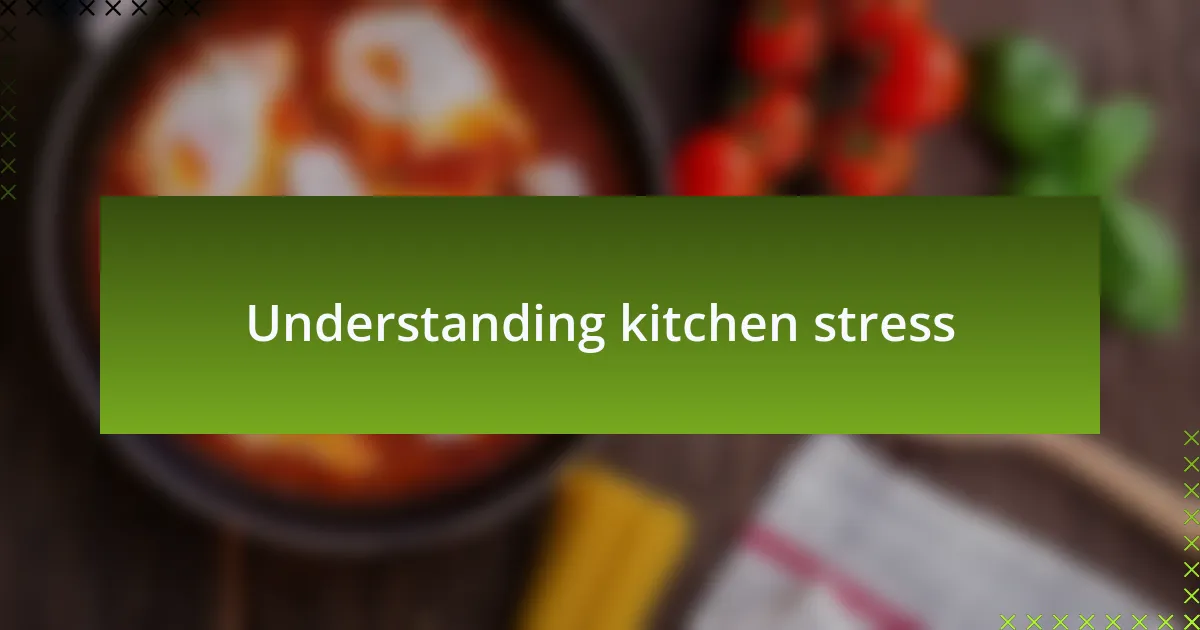
Understanding kitchen stress
Kitchen stress is a reality many chefs and restaurant staff face, often springing from the pressure of perfection in a high-stakes environment. I remember a particularly chaotic dinner service where the orders piled high while a critical ingredient went missing. That moment, I felt my heart racing, and I couldn’t help but wonder, how does one maintain composure when everything feels out of control?
In my experience, kitchen stress often stems from the sheer intensity of the fast-paced culinary world. The need to deliver exquisite dishes with precision, all while juggling multiple tasks, creates a unique cocktail of pressure. It makes me reflect: what strategies can one employ to not just survive but thrive in such an environment? I’ve found that cultivating mindfulness during rush hours helps me stay grounded.
Every kitchen has its rhythm, and understanding this rhythm is key to managing stress effectively. I’ve learned to anticipate the ebbs and flows of service, which significantly lessens that overwhelming feeling. Have you ever noticed how a well-prepared kitchen seems to dance in sync? That kind of harmony isn’t just about skill; it’s built on a foundation of trust and communication—critical elements that can transform stress into a collaborative experience.
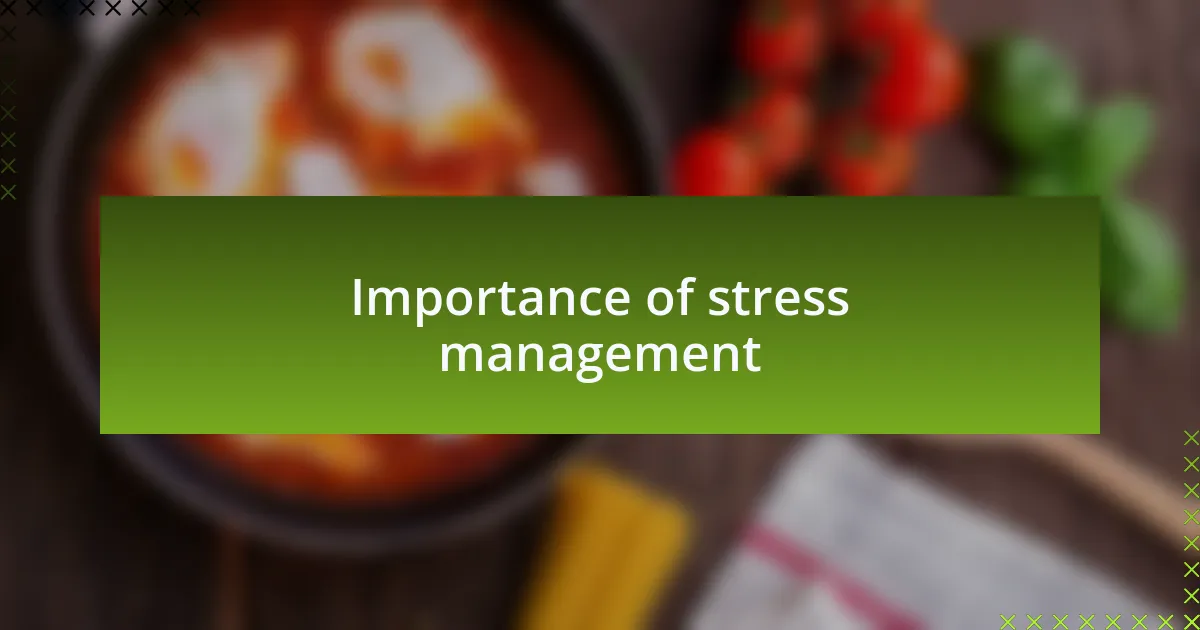
Importance of stress management
The ability to manage stress is crucial in the kitchen, impacting not just individual performance but also the entire team dynamics. I’ve encountered nights when the tension was palpable, with each staff member mirroring the anxiety of their peers. In those moments, a simple glance or a shared smile can lighten the mood, underscoring the importance of connection amidst chaos.
When stress goes unmanaged, it can lead to burnout and high turnover rates, which ultimately hurt the restaurant’s reputation and service quality. I remember a time when a talented chef left our team because the pressure became unbearable, a loss that echoed through our kitchen for months. It reminds me that prioritizing stress management isn’t just about personal well-being; it fosters an environment where everyone can shine and bring their best to the table.
Effective stress management also heightens creativity, allowing chefs to experiment without fear of failure. I once decided to try a bold flavor combination during a particularly hectic service—while others hesitated, I embraced the chaos as inspiration. That dish not only surprised our customers but also taught me that when we acknowledge and regulate our stress, we create space for innovation and excellence to thrive.
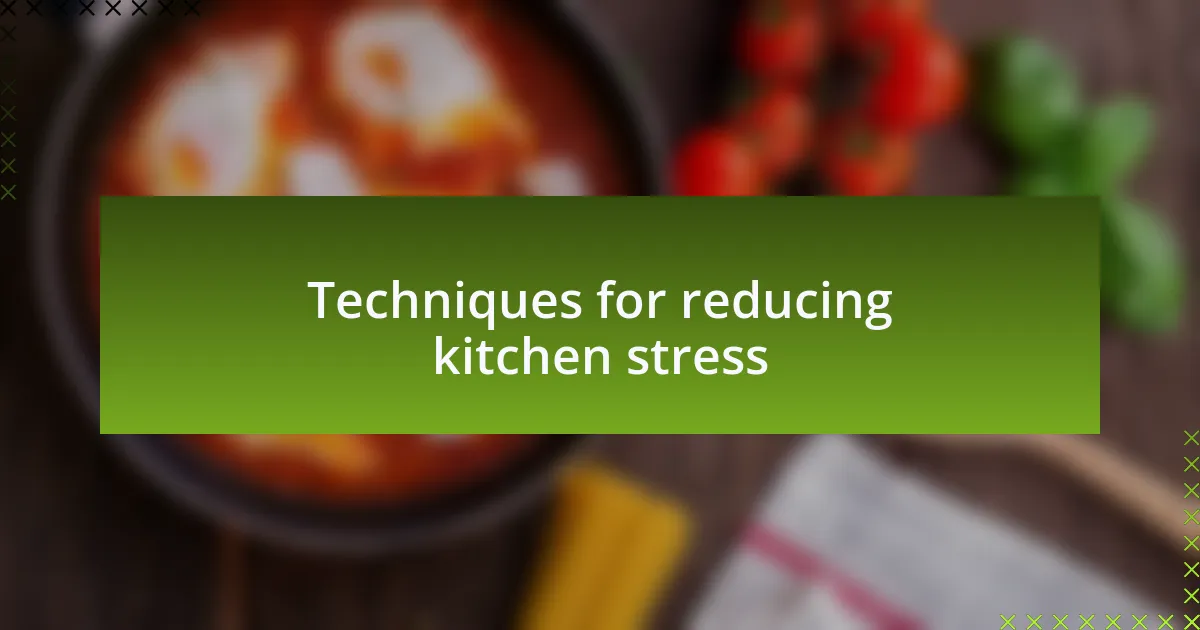
Techniques for reducing kitchen stress
One effective technique I’ve found for reducing kitchen stress is embracing a structured mise en place. This French term simply means “everything in its place.” When I first started, I would often scramble for ingredients mid-service, heightening my anxiety. But once I dedicated time to organize and prepare my station ahead of the rush, I noticed a remarkable decrease in chaos. How could something so simple transform my experience? It allows me to focus on execution rather than search for what I need.
Another approach that has worked wonders is fostering open communication among team members. I recall a particularly challenging night when a component of a dish was missing. Instead of panicking, I turned to my team and openly discussed our options. This not only diffused the tension but also led to a creative solution that kept our service running smoothly. Isn’t it fascinating how collaboration can alleviate stress, turning potential disaster into an opportunity for teamwork?
Lastly, I find that taking brief moments for mindfulness can significantly lower anxiety levels. During a particularly hectic dinner service, I discovered the power of taking just a minute to breathe deeply and refocus. This simple act reminded me of my love for cooking and rekindled my passion amidst the heat of the moment. Have you ever experienced how a tiny pause can reset your entire mindset? It truly transformed my approach to the hustle and bustle of the kitchen.
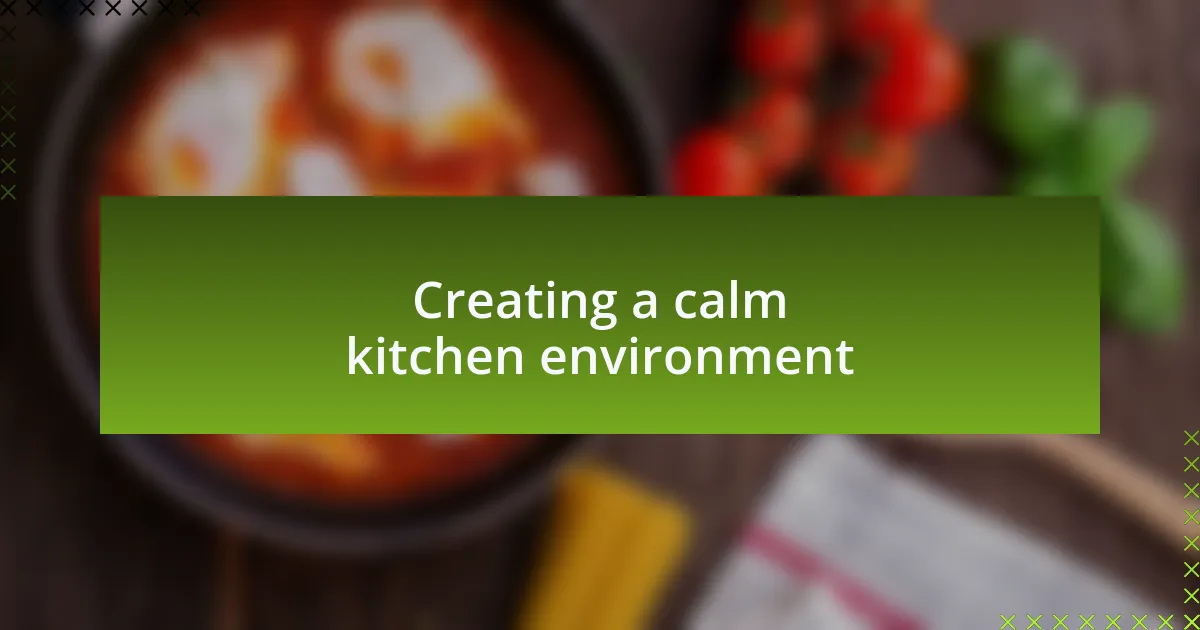
Creating a calm kitchen environment
Creating a calm kitchen environment starts with the physical layout of the space. I remember the first time I walked into a kitchen that felt more like a sanctuary. The well-organized counters, soothing colors, and strategic arrangement of tools made all the difference. It struck me how such simple adjustments could influence not just productivity, but also the overall atmosphere. Have you ever considered how your surroundings impact your mood?
In my experience, incorporating elements of nature into the kitchen amplifies that calming effect. I love having fresh herbs on the windowsill or a small potted plant nearby. This not only brightens the space but also introduces a refreshing aroma that cuts through the chaos. It’s incredible how these small touches can provide a sense of tranquility. How often do we overlook the power of our environment in cultivating a focused, peaceful workspace?
Establishing clear zones for specific tasks also plays a crucial role. I’ve seen firsthand how designating areas for prep, cooking, and plating can minimize confusion. The first time I implemented this, the kitchen felt more intuitive. I could move seamlessly from one task to another, allowing me to maintain my composure, even during peak hours. Isn’t it revolutionary how a little organization can evoke a sense of calm amidst the whirlwind?
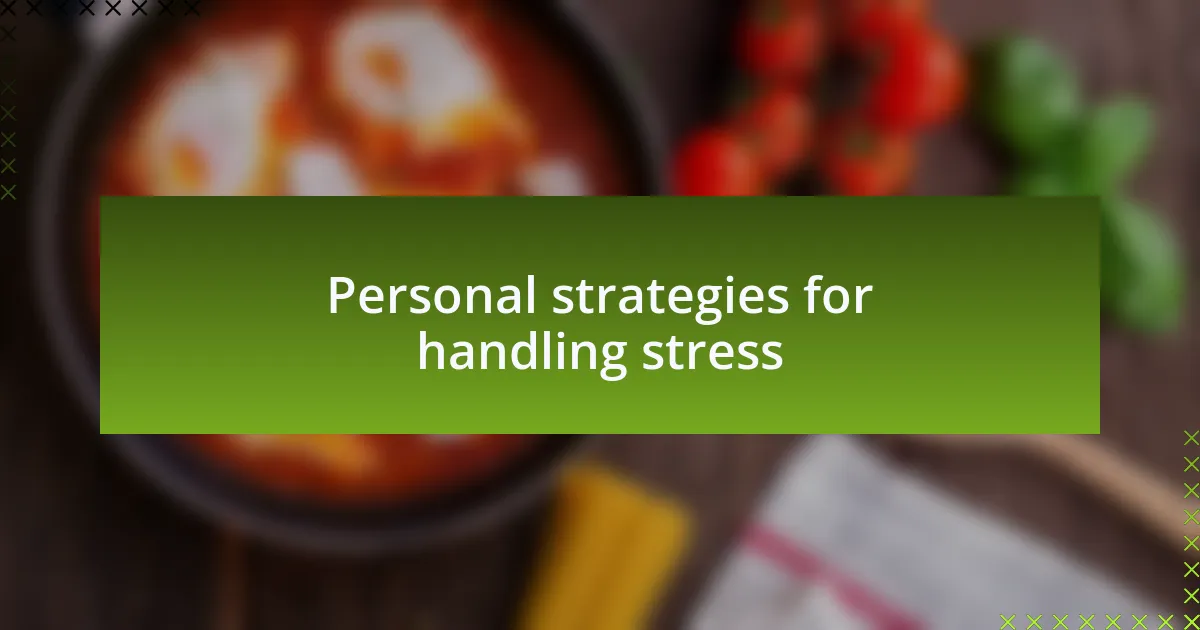
Personal strategies for handling stress
Personalizing my approach to stress management has been essential in the kitchen. One technique I rely on is deep breathing. I remember a particularly chaotic dinner service when the orders piled up. I took a moment to step back, close my eyes, and inhale deeply. That simple act helped clear my mind and brought me back to my center. Have you ever noticed how a few regulated breaths can shift your entire perspective?
Another strategy involves harnessing the power of music. I’ve found that playing my favorite soothing tunes can create an uplifting and focused atmosphere. It’s remarkable how a good playlist can energize the team and lighten the mood, even during the busiest shifts. Have you thought about how the right soundtrack could transform your working environment?
I also advocate for taking brief breaks, even in the heat of service. I recall a night where I stepped outside for just a couple of minutes to feel the cool air on my face. Those moments of respite act as a reset, allowing me to return with renewed focus and vigor. How valuable can a little pause be when the kitchen feels overwhelming?
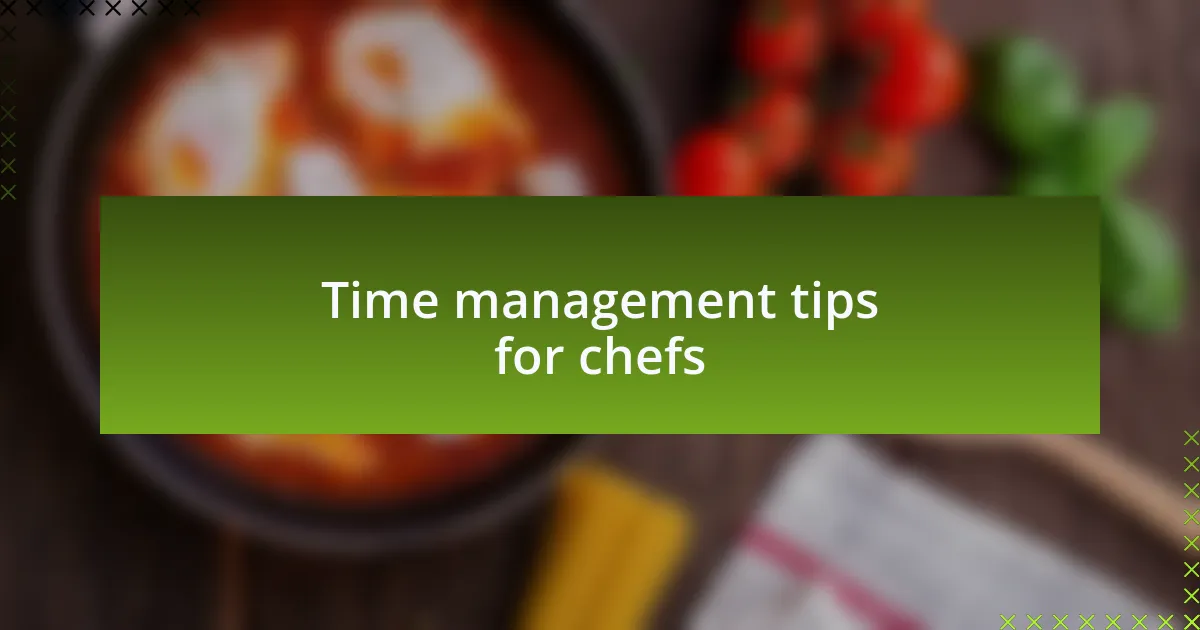
Time management tips for chefs
One of the most effective time management tips I’ve implemented is creating a mise en place, which means “everything in its place.” This practice goes beyond mere organization; it involves prepping all ingredients and tools before service begins. I’ll never forget the night I decided to ignore this rule. I spent the entire first hour scrambling for items, and it turned a smooth service into a near-disaster. Have you ever felt the chaos unfold simply because you didn’t have everything ready?
Prioritizing tasks is another key strategy that I find invaluable. I always start by tackling the most urgent orders first and then move on to those that can wait. There was a particularly hectic Valentine’s Day when I had to balance multiple table requests while keeping the kitchen running smoothly. By focusing on what needed my immediate attention, I avoided overwhelming myself. Don’t you think breaking down the workload into manageable parts can make it easier to breathe during peak hours?
Additionally, I’ve learned the importance of setting time limits for each task. This may seem stressful at first, but it helps sharpen my focus. For instance, I set a timer while plating dishes, pushing myself to work efficiently without sacrificing quality. I remember, in the past, I would linger too long on details, like arranging garnishes meticulously. Reining in that tendency helped me maintain momentum. How can a little self-imposed pressure reinvigorate your workflow in the kitchen?
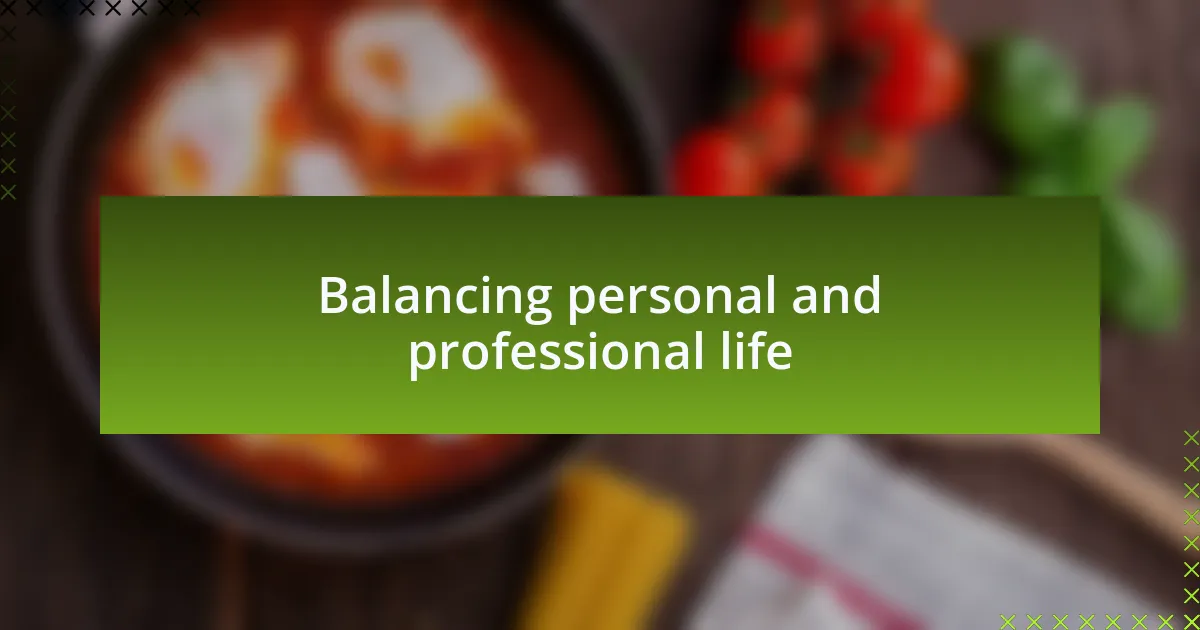
Balancing personal and professional life
Finding a balance between personal and professional life is crucial in this demanding industry. I’ve experienced the struggle firsthand; there were nights when I found myself dreading going home after work, feeling overwhelmed by the long hours and the heat of the kitchen. One evening, after an intense dinner rush, I took a moment to reflect. I realized that by not nurturing my personal life, I was draining my passion for cooking. Have you ever felt that disconnect between your work and home life?
To maintain equilibrium, I’ve learned to set boundaries that protect my personal time. For instance, after a grueling week, I designate my Sundays as a “no-work zone.” Spending that time with family or pursuing hobbies revitalizes me and reignites my creativity in the kitchen. It’s a simple yet effective reminder that my identity extends beyond being a chef. How do you ensure you recharge when the demands of work threaten your personal space?
Additionally, communication plays a vital role in this balance. I make it a point to share my challenges with friends and family; this lightens my emotional load significantly. There was a time I was hesitant to let my loved ones in, thinking I had to shoulder my kitchen stress alone. Opening up not only helped me process my feelings but also strengthened my relationships. Isn’t it remarkable how sharing our struggles can lead to deeper connections?